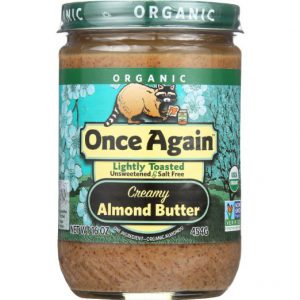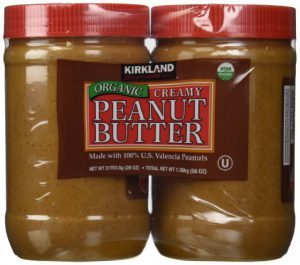Almond Butter and Peanut Butter Challenge
Which Nut Butter Is More Healthy?
If you are not allergic to peanuts, then eating peanut butter probably has been a staple in your diet since growing up. It is hard to find anyone not liking peanut butter. Have you tried almond butter? Do you know the difference between almond butter vs peanut butter? Once you know the differences, you may want to think about changing.
The age old question is; which is better almond butter or peanut butter? Continue reading and you will find out.
First of all, all nuts in their wholesome state are good for you as they have some healthy antioxidants that are good for your body. They also are good in protein, fiber, vitamin and minerals.
However, when you put the crunched nuts into a jar to spread on your bread, toast or cracker, it’s the added ingredients like sugar, palm oil, palm fruit oil and hydrogenated vegetable oils that are not healthy for you and should be avoided.
You should look for butters that have only peanuts and almonds and very little salt in the ingredients list.
Peanut Butter & Almond Butter Comparison
To answer our question we posed at the beginning, peanut butter and almond butter are both nutritious, however, one is more nutritious than the other.
What are the ingredients and nutrition information of these butters? Let’s look at some of the vitamins and minerals to determine which one is actually the best.
Vitamin E
Vitamin E protects your cells from oxidation damage. It also neutralizes free radicals, preventing these harmful chemicals from oxidizing your DNA and damaging your cells. Almond butter contains about 4 milligrams of Vitamin E per tablespoon; which is 27% of your daily vitamin E requirements. Peanut butter contains only 1 milligram of vitamin E per tablespoon.
Advantage: Almond Butter
Magnesium
Magnesium contributes to the function of your nervous system, facilitates muscle contraction, makes up a component of healthy bone tissue and helps support your metabolism. A tablespoon of almond butter contains 45 milligrams of magnesium or 11% of the magnesium requirements for men and 14% for women. This is according to the Office of Dietary Supplements. Peanut butter only contains 26 milligrams per tablespoon or about half.
Advantage: Almond Butter
Iron
This mineral promotes healthy oxygen transport by helping you make hemoglobin and myoglobin, two proteins that oxygenate your tissues. It also protects your cells from oxidative damage. A tablespoon of almond butter contains 0.6 milligrams of iron, compared to 0.3 milligrams for peanut butter. Each tablespoon of almond butter provides 8% of your daily iron requirements for men, and 3% for women, according to the Linus Pauling Institute.
Advantage: Almond Butter
Vitamins and Minerals
Vitamins and minerals are an important part of a healthy diet and almond butter leads when you closely examine the vitamin and mineral content. Almond butter contains three times as much vitamin E, twice as much iron, and seven times more calcium than peanut butter. Peanut butter does not lack vitamins and minerals as it has plenty of vitamin E, calcium and iron. It just has less than almond butter.
Both peanut butter and almond butter contain healthy doses of potassium, biotin, magnesium and zinc.
Advantage: Almond Butter
Healthy Fats
All types of nut butters contain a large amount of fat. However, it does not mean they are bad for you. It’s the type of fat that you should be concerned about. This is where almond butter has an edge over peanut butter.
The fat here is monounsaturated fat, the type of fat linked to a reduction in heart disease and helps with blood sugar control. Almond butter contains 25% more monounsaturated fat in 2-tablespoons versus the same amount in peanut butter.
A standard serving of peanut butter has more than twice as much saturated fat than a serving of almond butter. This type of fat is not harmful when eaten in moderation, but too much of it can raise your cholesterol level, which can increase your risk of cardiovascular disease.
Advantage: Almond Butter
Fiber
Fiber make you full quicker, which helps to maintain a healthy weight. It also helps to lower your cholesterol.
All nuts contain fiber. When you compare fiber content, almond butter have roughly 3.3 grams of fiber per two tablespoons verses 1.6 grams of fiber for the same amount of peanut butter.
Advantage: Almond Butter
Protein
Nut butters are a good source of vegetable protein. Peanut butter has a small advantage over almond butter in terms of protein content. There are 7.1 grams of protein in a single serving of peanut butter, verses 6.7 grams of protein in a single serving of almond butter.
Advantage: Peanut Butter
Sugar
This is where you need to be careful. Almond butter has less sugar, but, natural almond butter and peanut butter are both low in sugar in general. However, some brands of nut butters sweeten theirs with added sugar.
Whichever brand you choose, always aim for the natural version of nut butters. You must read the label to ensure that sugar isn’t on it. If it is, don’t buy it. You are eating unwanted sugar.
Advantage: Even
Calories
When it comes to calories, most nut butters either peanut or almond are under 200 calories, per two tablespoon serving. Generally speaking, peanut butter will have less calories per serving than most almond butters.
If you are concerned about calories, go with peanut butter. Both nut butters are considered to be high in calories when compared with other foods, just limit the amount you spread on your bread, toast and crackers.
Advantage: Peanut Butter
Price
The pricing of nut butters is not even close. Peanut butters are less expensive than almond butters and have a huge advantage here. If cost is important to you than peanut butter is your choice. If not, almond butter is a better selection.
Advantage: Peanut Butter
Overall
In the final analysis of the comparisons between peanut butter and almond butter, almond butter comes out on top. However, the choice is yours and it will probably be based on your pocketbook and preferences.
A final reminder, look for peanut or almond butters that are organic, natural and only have two or less ingredients (nuts and salt). Be sure that the salt content is 125 mg or less. Almond or peanut butters with no added salt is best.
Conclusion
As for me, I like almond butter better because in the final analysis is the better of the two nut butters. I like the taste, and it has more vitamin, mineral, and nutritional content.
For you, it may come down to taste or the value of the vitamin and mineral content. Do not forget almond butter is best nutritional choice.
If you suffer from peanut allergies, almond butter is an excellent alternative to use as a spread over bread and crackers.
If you insist on eating peanut butter, then look for peanut butters that are organic, and natural and they will not have the added ingredients mentioned earlier.
Also, get in the habit of reading the labels and become familiar with them prior to purchasing. Just don’t buy a product based solely on reputation. Actually read the ingredients and nutrition labels. By doing this, it will be much easier to return an item to the shelf prior to going through the checkout counter. Then, taking the product home and reading the ingredients and having to return it to the store for a refund.
Check the links below to find out for yourself. I hope you will at least try almond butter. There are products for peanut butter if that is your choice. All of these products are on Amazon.
ROW 1
ROW 2
Go back to the Gluten Free Diet With Nutrition home page.

